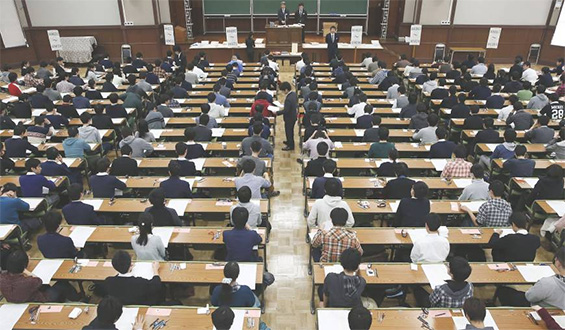
Japan’s national government has ordered universities to cut back on the humanities and social sciences in response to what the government sees as demand in other, more important areas.
Education minister Hakuban Shinomura sent a letter to Japan’s 86 national universities in June, reports Jack Grove of the Times of Higher Education, asking them to take “active steps to abolish
According to a survey done by the Yomiuri Shimbun at the end of July, of the 60 national universities that offer affected subjects (which include economics, education, and law) 26 will either close their faculties or scale them back. 17 will stop recruiting students in these areas for a combined total of 1,300 university seats.
Niigata University said in response to the survey that:
The study of humanities and social sciences is important in a university education, but it must be reviewed to ensure the quality of education.
The statement has received significant criticism, with one university president calling it “anti-intellectual,” and the universities of Tokyo and Kyoto refusing to comply with the new policy. The Science Council of Japan also expressed its “profound concern over the potentially grave impact that such an administrative directive implies for the future of the [humanities and social sciences]in Japan.”
Japan News quoted Shiga University on the implications of a shift away from these disciplines:
Democracy cannot be preserved if the “intellectual knowledge” of humanities and social science studies is cast aside.
The letter from the ministry also asked each university to reach for one of three goals for their continued financial support: regional contribution, specializing in a certain field, or reaching a global standard of education. According to the survey, regional contribution was chosen by 54, specialization by 12, and reaching global standards by 15.
Higher education policies in Japan are governed by the Council on Industrial Competitiveness, writes Shiga University President Takamitsu Sawa in the Japan Times, and the body is made up of nine Cabinet ministers, seven corporate managers, and two scholars — one engineer and one economist.
Sawa said:
The foundation of democratic and liberal societies is a critical spirit, which is nurtured by knowledge of the humanities. Without exception, totalitarian states invariably reject knowledge in the humanities, and states that reject such knowledge always become totalitarian.
Japanese universities have been facing ongoing financial pressures due to a low birth rate and dropping enrollment. Some institutions are running at less than 50% capacity. Even so, the education minister’s goal is for 10 Japanese universities to reach the top 100 worldwide. Only two are on the list right now.
According to Sawa:
Why is it … that Japanese universities rank so low? One big reason is the low levels of education and research in the humanities and social sciences. Schools like the University of Oxford, the University of Cambridge, Stanford University and Harvard University, all of which are among the world’s top 10, are highly reputed in these fields.




